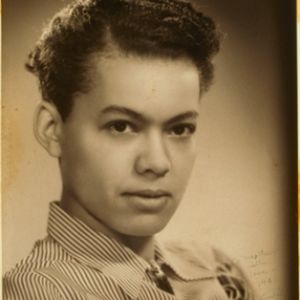
At the front of the Civil Rights Movement, alongside such leaders as Martin Luther King, Jr. and Rosa Parks, but lesser known, was Pauli Murray, an outspoken woman who protested discrimination on the basis of race and sex. She coined the term “Jane Crow,” which demonstrated Murray’s belief that Jim Crow laws also negatively impacted African-American women. She was determined to work with other activists to put a halt to both racism and sexism. Murray’s speech, “Jim Crow and Jane Crow,” delivered in Washington, D.C. in 1964, sheds light on the long struggle of African-American women for racial equality and their later fight for equality among the sexes. Pauli Murray ultimately helped push the American Civil Rights Movement by letting her audience know that women’s rights were just as important as civil rights. “Jim Crow and Jane Crow,” Murray’s speech, was given in during Lyndon B. Johnson’s presidency. It primarily addresses an audience of African-American women. Pauli Murray acknowledges the fact that African-American women have always contributed to the progress of the Civil Rights Movement. She believes that African-American women have worked just as hard, if not harder than, African-American men to achieve equal rights among whites and blacks. According to Murray, “Not only have they stood…with Negro men in every phase of the battle, but they have also continued to stand when their men were destroyed by it.”The black women decided to “…continue…[standing]…” for their freedom and liberty even when “…their men…” began to experience exhaustion from a long struggle for civil rights. These women were unafraid to stand up for what they believed in and refused to back down from the long and tedious “battle.” Murray continues her praise for black women when she says that “…one cannot help asking: would the Negro struggle have come this far without the indomitable determination of its women?” The “Negro struggle” was able to progress partly because of “…the indomitable determination of its women.” African-American women were vital to the Civil Rights Movement and pushed it forward with their own might. They were just as important to the black struggle for racial justice as their male counterparts. Their work ethic and persistence defined African-American women as important to a long fight against racism in America.
Thurgood Marshall, then NAACP Chief Counsel and a future Supreme Court Justice, called Murray’s book the “bible” of the civil rights movement. Her approach was influential to the NAACP’s arguments in Brown v. Board of Education of Topeka (1954), by which they drew from psychological studies assessing the effects of segregation on students in school. The US Supreme Court ruled that segregated public schools were unconstitutional.
Murray lived in Ghana from 1960 to 1961, serving on the faculty of the Ghana School of Law.She returned to the US and studied at Yale Law School, in 1965 becoming the first African American to receive a J.S.D. (Juris Scientium Doctor, Doctor of the Science of Law) from the school. She taught at Brandeis University from 1968 to 1973, where she received tenure as Full Professor in American Studies.
Murray served as vice president of Benedict College from 1967–68. She left Benedict to become a professor at Brandeis University, where she remained until 1973.In addition to teaching law, Murray introduced classes on African-American studies and women’s studies, both firsts for the university. Murray later wrote that her time at Brandeis was “the most exciting, tormenting, satisfying, embattled, frustrated, and at times triumphant period of my secular career”.
Increasingly inspired by her connections with other women in the Episcopal Church, Murray, now more than sixty years old, left Brandeis to attend the seminary. After three years of study, in 1977 she became the first African-American woman ordained as an Episcopal priest and among the first generation of Episcopal women priests. That year she celebrated her first Eucharist by invitation at Chapel of the Cross; this was the first time a woman celebrated the Eucharist at an Episcopal church in North Carolina. In 1978 she preached her first sermon in her ‘hometown’ of Durham, North Carolina, on Mother’s Day at St. Philip’s Episcopal Church, where her mother and grandparents had attended in the 19th century. She announced her mission of reconciliation. For the next seven years, Murray worked in a parish in Washington, D.C., focusing particularly on ministry to the sick.
The Rev. Dr. Pauli Murray died of pancreatic cancer in the house she owned with a lifelong friend, Maida Springer Kemp, in Pittsburgh, Pennsylvania, on July 1, 1985.
In 2012 the General Convention of the Episcopal Church voted to honor Murray as one of its Holy Women, Holy Men, to be commemorated on July 1, the anniversary of her death, along with fellow writer Harriet Beecher Stowe.Bishop Michael Curry of the Episcopal Diocese of North Carolina said this recognition honors “people whose lives have exemplified what it means to follow in the footsteps of Jesus and make a difference in the world.”
In 2015 the National Trust for Historic Preservation named the childhood home of Murray (on Carroll Street in Durham, North Carolina’s West End neighborhood) as a National Treasure. In April 2016, Yale University announced that their leadership had selected Murray as the namesake of one of two new residential colleges, the other of which will be named after Benjamin Franklin upon completion in 2017.
